15 Uplifting Bible Verses About Depression
The Bible offers profound comfort and guidance for those struggling with the heavy burden of depression. Scripture is filled with verses that speak directly to the heart, offering reassurance of God’s love, presence, and healing power.
These bible verses about depression remind us that we are never truly alone and that even in our darkest moments, there is hope and light to be found in God’s promises.
In this blog post, we will explore several Bible verses that provide encouragement and strength for those facing the challenges of depression, helping to lift spirits and renew faith in God’s unwavering care.
Bible Verses on Depression
Depression in the Bible
Deuteronomy 31:8
And the Lord, he it is that doth go before thee; he will be with thee, he will not fail thee, neither forsake thee: fear not, neither be dismayed.
The Lord himself goes before you and will be with you; he will never leave you nor forsake you. Do not be afraid; do not be discouraged.
Do not be afraid or discouraged, for the Lord will personally go ahead of you. He will be with you; he will neither fail you nor abandon you.
It is the Lord who goes before you. He will be with you; he will not leave you or forsake you. Do not fear or be dismayed.

Deuteronomy 31:8 is part of Moses’ farewell speech to the Israelites as they prepare to enter the Promised Land. In this passage, Moses is encouraging Joshua, who is set to lead the Israelites after Moses, and the people themselves. The verse emphasizes God’s constant presence and faithfulness, assuring them that they should not fear or be disheartened because God will guide and support them through their journey and the challenges ahead.
Deuteronomy 31:8 can be particularly meaningful in the context of dealing with depression. This scripture provides a message of hope and assurance, emphasizing that God is always present and supportive, even in difficult times. Here’s how it can be applied to depression:
- God’s Presence: The verse begins by affirming that God goes before you and will be with you. For someone experiencing depression, this can be a comforting reminder that they are not alone. Even when it feels like no one understands or is there to help, this verse reassures that God’s presence is constant.
- Faithfulness: The verse continues by stating that God will never leave you nor forsake you. This can be especially powerful for those feeling abandoned or isolated. It emphasizes that God’s support is unwavering and dependable, offering a source of stability and reliability.
- Encouragement: The command to not be afraid or discouraged addresses common feelings associated with depression, such as fear and hopelessness. This part of the verse encourages individuals to find courage and hope, knowing that God’s strength and support are available to them.
- Hope and Reassurance: The overall tone of the verse is one of reassurance and encouragement. It can serve as a reminder that despite the darkness and struggles of depression, there is a greater presence looking out for them and guiding them through their difficulties.
2 Samuel 22:29
For thou art my lamp, O Lord: and the Lord will lighten my darkness.
You, Lord, are my lamp;
the Lord turns my darkness into light.
O Lord, you are my lamp.
The Lord lights up my darkness.
For you are my lamp, O Lord,
and my God lightens my darkness.
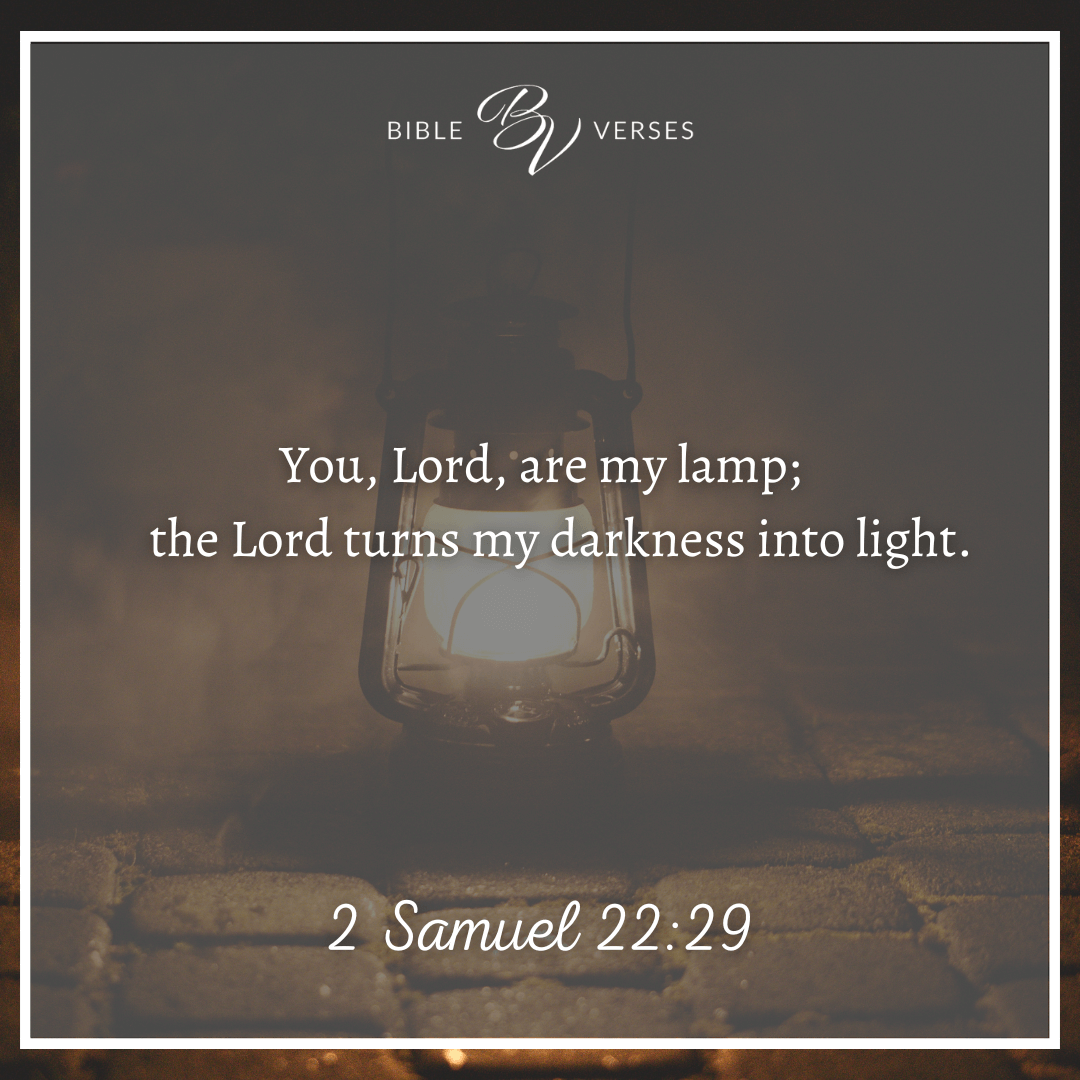
2 Samuel 22:29 is part of a song of praise and thanksgiving that King David sings to the Lord. This chapter is nearly identical to Psalm 18 and expresses David’s gratitude for God’s deliverance from his enemies and from the hand of Saul.
David describes the Lord as his lamp, symbolizing that God provides clarity, direction, and guidance in his life. Just as a lamp lights up a dark path, God illuminates the way for David, helping him to see and understand what he needs to do.
The second part of the verse emphasizes God’s power to turn darkness into light. This can be understood both literally and metaphorically. In times of trouble, confusion, or despair, which can be described as “darkness,” God brings hope, understanding, and relief, which are “light.”
In the broader context of the chapter, David is reflecting on how God has delivered him from his enemies and guided him through difficult times. This verse is a personal testament to God’s ability to bring transformation and salvation.
For readers, this verse serves as a reminder of God’s presence and the hope that comes with divine intervention. It encourages faith in God’s ability to bring light into dark situations.
Psalm 3:3
But thou, O Lord, art a shield for me; my glory, and the lifter up of mine head.
But you, Lord, are a shield around me,
my glory, the One who lifts my head high.
But you, O Lord, are a shield around me;
you are my glory, the one who holds my head high.
But you, O Lord, are a shield about me,
my glory, and the lifter of my head.

For someone experiencing depression, this verse can be incredibly comforting. The metaphor of God as a shield shows a protective presence that surrounds and guards against the feelings of hopelessness and despair.
Calling God his glory signifies that David finds his true worth and identity not in his circumstances, but in his relationship with God. For someone dealing with depression, which often erodes self-esteem, self-worth, and self-love, this part of the verse offers a powerful reminder that their value is inherent and recognized by God.
Psalm 9:9
The Lord also will be a refuge for the oppressed, a refuge in times of trouble.
The Lord is a refuge for the oppressed,
a stronghold in times of trouble.
The Lord is a shelter for the oppressed,
a refuge in times of trouble.
The Lord is a stronghold for the oppressed,
a stronghold in times of trouble.

This verse emphasizes that God provides protection and support for those who are suffering or facing difficulties. God is a safe haven—a refuge where the oppressed can find safety and comfort.
Psalm 23:4
Yea, though I walk through the valley of the shadow of death, I will fear no evil: for thou art with me; thy rod and thy staff they comfort me.
Even though I walk
through the darkest valley,
I will fear no evil,
for you are with me;
your rod and your staff,
they comfort me.
Even when I walk
through the darkest valley,
I will not be afraid,
for you are close beside me.
Your rod and your staff
protect and comfort me.
Even though I walk through the valley of the shadow of death,
I will fear no evil,
for you are with me;
your rod and your staff,
they comfort me.

Psalm 23:4 offers profound comfort to those experiencing depression. The verse speaks of walking through the “darkest valley” or “the valley of the shadow of death,” which resonates deeply with the feelings of deep despair and hopelessness often associated with depression.
In this context, the assurance “I will fear no evil, for you are with me” highlights the comforting presence of God, providing a sense of companionship and understanding during the darkest times.
The reference to God’s “rod and staff” symbolizes protection and guidance, showing that even when everything seems bleak, there is divine support and direction available.
Psalm 30:11
Thou hast turned for me my mourning into dancing: thou hast put off my sackcloth, and girded me with gladness;
You turned my wailing into dancing;
you removed my sackcloth and clothed me with joy,
You have turned my mourning into joyful dancing.
You have taken away my clothes of mourning and clothed me with joy,
You have turned for me my mourning into dancing;
you have loosed my sackcloth
and clothed me with gladness,

This verse celebrates a transformation from mourning and sorrow to joy and celebration, attributed to God’s intervention and grace. It reflects a personal testimony of the psalmist, likely King David, who experienced God’s deliverance from a period of distress or suffering.
For someone struggling with depression, this verse can serve as a reminder that their current state is not permanent. It encourages faith in God’s ability to bring about a turnaround in emotions, replacing sorrow with joy. It emphasizes the truth that God cares deeply about our emotional well-being and is able to bring comfort and renewal to those who seek Him.
Psalm 34:17
The righteous cry, and the Lord heareth, and delivereth them out of all their troubles.
The righteous cry out, and the Lord hears them;
he delivers them from all their troubles.
The Lord hears his people when they call to him for help.
He rescues them from all their troubles.
When the righteous cry for help, the Lord hears
and delivers them out of all their troubles.
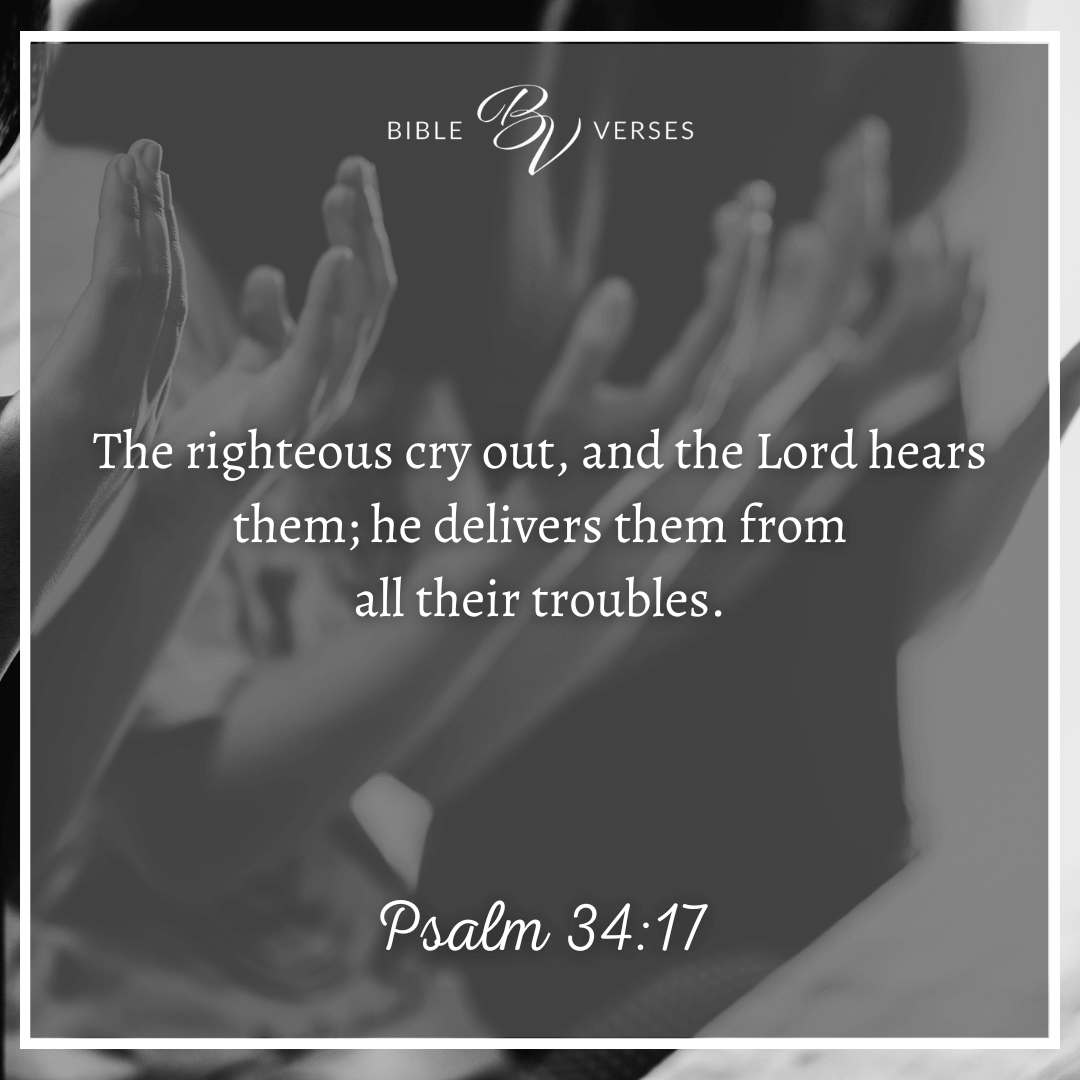
Psalm 34:17 speaks about the righteous calling out to the Lord in their distress and the Lord hearing them. It emphasizes that God delivers them from all their troubles. God is attentive to the cries of His people and actively intervenes to rescue them from adversity and hardship.
Psalm 42:11
Why art thou cast down, O my soul? and why art thou disquieted within me? hope thou in God: for I shall yet praise him, who is the health of my countenance, and my God.
Why, my soul, are you downcast?
Why so disturbed within me?
Put your hope in God,
for I will yet praise him,
my Savior and my God.
Why am I discouraged?
Why is my heart so sad?
I will put my hope in God!
I will praise him again—
my Savior and my God!
Why are you cast down, O my soul,
and why are you in turmoil within me?
Hope in God; for I shall again praise him,
my salvation and my God.
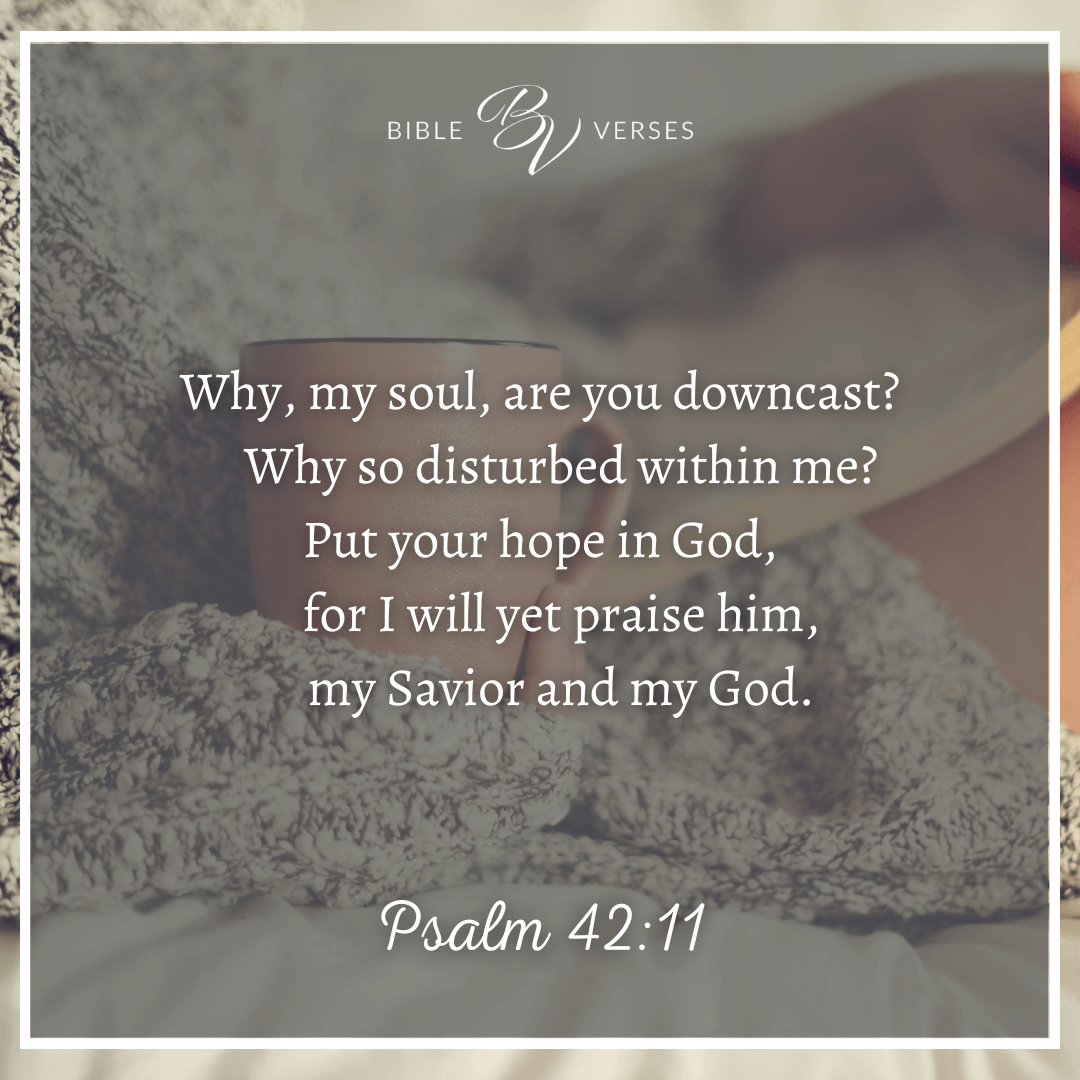
This verse reflects the inner dialogue of the psalmist who is struggling with feelings of despair and sadness. Here’s a breakdown of its meaning:
- Acknowledgement of Emotional Turmoil: The psalmist openly addresses his own soul, questioning why it feels downcast and disturbed. This shows a deep awareness of his emotional state and the turmoil he is experiencing.
- Encouragement to Hope in God: Despite the feelings of distress, the psalmist encourages himself to put his hope in God. This is a deliberate choice to turn away from despair and instead trust in God‘s promises and faithfulness.
- Declaration of Faith: The verse ends with a declaration of faith and determination. The psalmist resolves to praise God, recognizing Him as his Savior and acknowledging His role in his life.
In the context of someone struggling with depression or intense sadness, Psalm 42:11 offers a message of self-reflection, encouragement, and faith. It acknowledges the reality of emotional turmoil but encourages turning to God for hope and eventual praise. It reminds individuals that even in their darkest moments, there is a choice to trust in God’s steadfast love and find strength in Him.
Psalm 91:2
I will say of the Lord, He is my refuge and my fortress: my God; in him will I trust.
I will say of the Lord, “He is my refuge and my fortress,
my God, in whom I trust.”
This I declare about the Lord:
He alone is my refuge, my place of safety;
he is my God, and I trust him.
I will say to the Lord, “My refuge and my fortress,
my God, in whom I trust.”

Psalm 91:2 is a powerful expression of confidence in God’s protective care and a call to place one’s trust wholly in Him. It encourages believers to affirm God’s role as their ultimate source of security and strength.
Matthew 11:28
Come unto me, all ye that labour and are heavy laden, and I will give you rest.
“Come to me, all you who are weary and burdened, and I will give you rest.
Then Jesus said, “Come to me, all of you who are weary and carry heavy burdens, and I will give you rest.
Come to me, all who labor and are heavy laden, and I will give you rest.

Matthew 11:28, where Jesus says, “Come to me, all you who are weary and burdened, and I will give you rest,” speaks directly to the emotional and spiritual burdens that people carry, including those with depression.
For someone struggling with depression, this verse offers a profound invitation from Jesus to find solace and relief in Him. It acknowledges the weariness and heaviness that depression often brings—feelings of hopelessness, fatigue, and emotional pain.
Jesus’ invitation to come to Him shows that He understands these struggles deeply and offers a place of refuge and rest.
John 10:10
The thief cometh not, but for to steal, and to kill, and to destroy: I am come that they might have life, and that they might have it more abundantly.
The thief comes only to steal and kill and destroy; I have come that they may have life, and have it to the full.
The thief’s purpose is to steal and kill and destroy. My purpose is to give them a rich and satisfying life.
The thief comes only to steal and kill and destroy. I came that they may have life and have it abundantly.

John 10:10 highlights Jesus’ mission to offer a life that is abundant and full, contrasting it with the destructive intent of the thief, Satan.
In relation to depression, this verse provides a profound message of hope and restoration. Depression often robs individuals of joy, purpose, and a sense of fullness in life, much like the enemy, who comes to steal, kill, and destroy.
Jesus’ promise of abundant life speaks directly to this, offering a vision of life filled with meaning, peace, and vitality. It assures those struggling with depression that through a relationship with Jesus, they can find renewal and the fullness of life that He intends for them.
John 16:33
These things I have spoken unto you, that in me ye might have peace. In the world ye shall have tribulation: but be of good cheer; I have overcome the world.
“I have told you these things, so that in me you may have peace. In this world you will have trouble. But take heart! I have overcome the world.”
I have told you all this so that you may have peace in me. Here on earth you will have many trials and sorrows. But take heart, because I have overcome the world.
I have said these things to you, that in me you may have peace. In the world you will have tribulation. But take heart; I have overcome the world.

John 16:33 is a verse where Jesus addresses His disciples before His crucifixion, preparing them for the trials they will face. In this verse, Jesus acknowledges the inevitability of trouble and hardship in the world.
However, He encourages His disciples to find peace and take heart because He has overcome the world. This statement reassures them of His victory over the challenges they will encounter, offering them hope and encouragement amidst adversity.
All these years later, we can still stand on the truth that He has overcome the world!
2 Corinthians 4:18
While we look not at the things which are seen, but at the things which are not seen: for the things which are seen are temporal; but the things which are not seen are eternal.
So we fix our eyes not on what is seen, but on what is unseen, since what is seen is temporary, but what is unseen is eternal.
So we don’t look at the troubles we can see now; rather, we fix our gaze on things that cannot be seen. For the things we see now will soon be gone, but the things we cannot see will last forever.
As we look not to the things that are seen but to the things that are unseen. For the things that are seen are transient, but the things that are unseen are eternal.
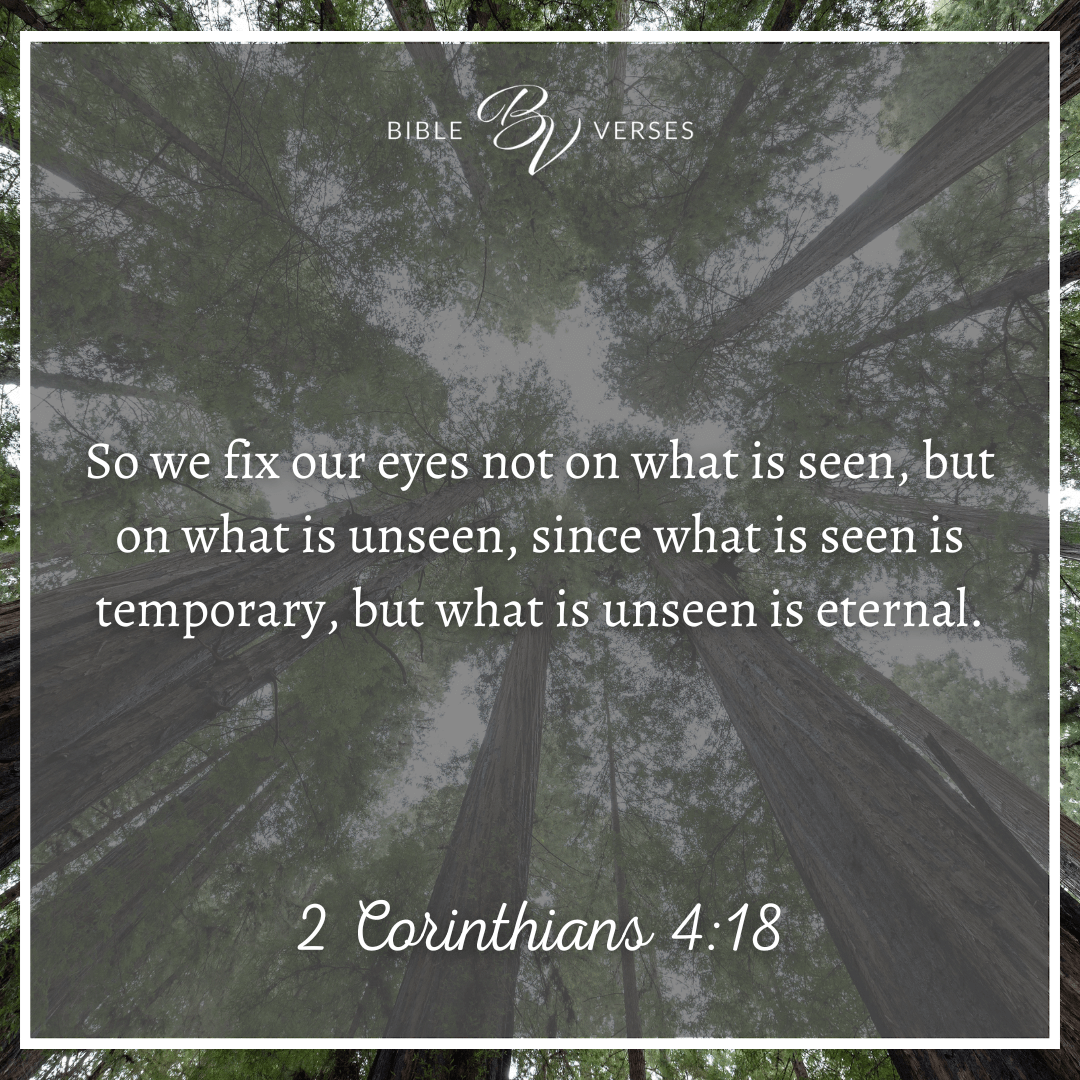
2 Corinthians 4:18 encourages believers to maintain a perspective that prioritizes eternal, spiritual truths over temporary, earthly concerns. The verse contrasts what is seen (the temporary) with what is unseen (the eternal), highlighting the fleeting nature of worldly troubles compared to the enduring nature of spiritual realities.
In relation to depression, 2 Corinthians 4:18 offers a perspective that can be profoundly comforting and transformative. Depression often brings an overwhelming focus on immediate difficulties and pain. This verse invites individuals to shift their focus beyond their current struggles and circumstances, encouraging them to consider the eternal truths of God’s love, His promises of hope and restoration, and the ultimate victory found in Christ.
For someone battling depression, this verse reminds that while their current feelings and challenges are real and significant, they are not the entirety of their existence. It invites them to place their trust in God’s promises.
Philippians 4:6-7
Be careful for nothing; but in every thing by prayer and supplication with thanksgiving let your requests be made known unto God.
And the peace of God, which passeth all understanding, shall keep your hearts and minds through Christ Jesus.
Do not be anxious about anything, but in every situation, by prayer and petition, with thanksgiving, present your requests to God. And the peace of God, which transcends all understanding, will guard your hearts and your minds in Christ Jesus.
Don’t worry about anything; instead, pray about everything. Tell God what you need, and thank him for all he has done. Then you will experience God’s peace, which exceeds anything we can understand. His peace will guard your hearts and minds as you live in Christ Jesus.
Do not be anxious about anything, but in everything by prayer and supplication with thanksgiving let your requests be made known to God. And the peace of God, which surpasses all understanding, will guard your hearts and your minds in Christ Jesus.
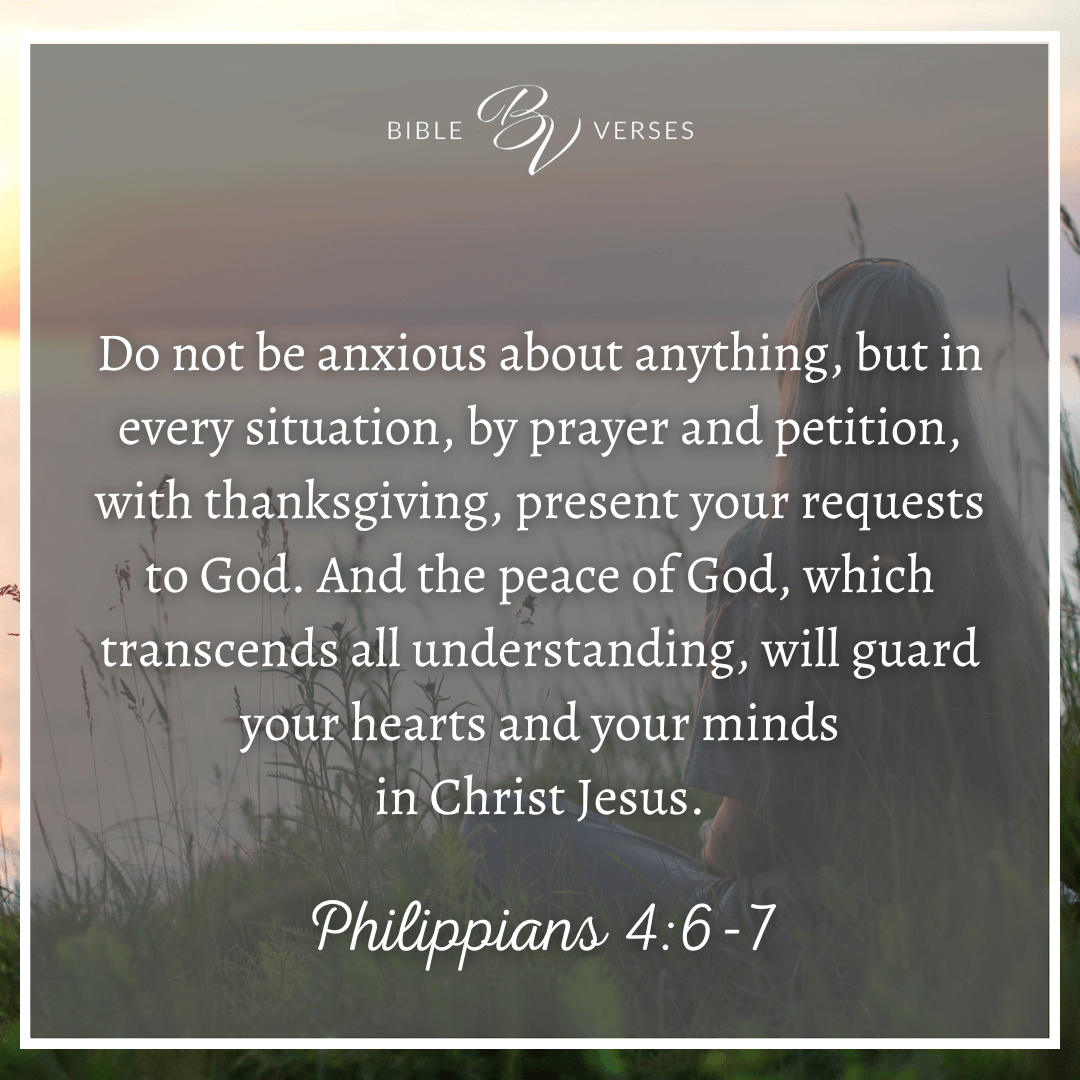
Philippians 4:6-7 addresses the topic of anxiety and how believers should respond to it. Paul first acknowledges anxiety as a real, inevitable feeling. He then instructs believers how to overcome their anxiety: to bring their concerns to God through prayer and petition, with a spirit of thanksgiving.
The passage promises that God’s peace, which surpasses all understanding, will guard their hearts and minds in Christ Jesus. In essence, these verses emphasize the importance of relying on prayer and trust in God’s provision.
1 Peter 5:7
Casting all your care upon him; for he careth for you.
Cast all your anxiety on him because he cares for you.
Give all your worries and cares to God, for he cares about you.
Casting all your anxieties on him, because he cares for you.

This verse encourages believers to entrust their anxieties and worries to God because He genuinely cares for them. It invites individuals to release their burdens to God through prayer and faith, recognizing His loving concern and willingness to provide comfort and support.










